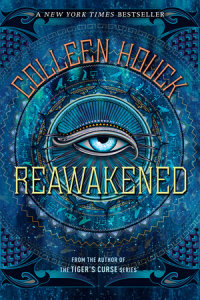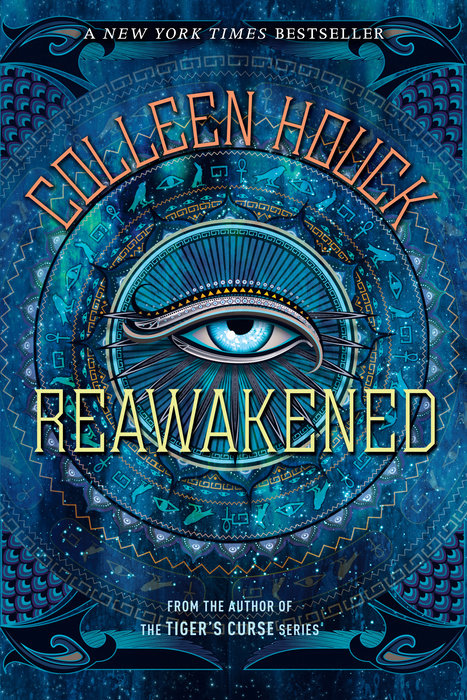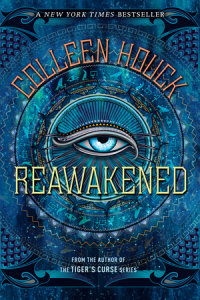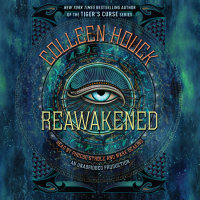Reawakened
Reawakened is a part of the The Reawakened Series collection.
A New York Times Bestseller!
From Colleen Houck, New York Times bestselling author of The Tiger’s Curse, comes an epic Egyptian-inspired adventure about two star-crossed teens who must battle mythical forces and ancient curses on a journey with more twists and turns than the Nile itself!
When seventeen-year-old Lilliana Young enters the Metropolitan Museum of Art one morning during spring break, the last thing she expects to find is a live Egyptian prince with godlike powers, who has been reawakened after a thousand years of mummification.
And she really can’t imagine being chosen to aid him in an epic quest that will lead them across the globe.
But fate has taken hold of Lily, and she, along with her sun prince, Amon, must travel to the Valley of the Kings, raise his brothers, and stop an evil, shape-shifting god named Seth from taking over the world.
And don't miss new adventures with Lily in the rest of the Reawakened series: Recreated and Reunited!
Praise for the Reawakened Series:
"[A] must-read for thrill-seekers and fans of alternate worlds."—RT Book Reviews
"Rick Riordan fans who are looking for another series will delight in this fantasy."—SLJ
"Wonderfully written and…the heart-pounding adventures are topped only by the heart-melting romance."—The Deseret News
"A sparkling new novel with a fully imagined world and mythos, and crackling romance! Egyptian mythology has never been this riveting!"—Aprilynne Pike, #1 New York Times bestselling author of the Wings series, on Reawakened, book one in the series
An Excerpt fromReawakened
1
House of Muses
“Fifteen fifty,” the driver demanded in a heavy accent.
“Do you take credit?” I responded politely.
“No. No cards.”
Giving a slight smile to the heavily browed eyes staring at me in the rearview mirror, I pulled out my wallet. As many times as I’d ridden in a New York City cab, I’d never gotten used to the attitude of the taxi drivers; it irked me every time. Still, it was either that or our family’s personal driver, who would shadow me around, reporting every move I made to my parents. All things considered, I much preferred independence.
I handed the driver a twenty and opened the door. Almost instantly, he sped off, leaving me struggling to maintain my footing while coughing in the cloud of gray exhaust he left behind.
“Jerk,” I mumbled as I smoothed my cropped trousers and then bent down to adjust a strap on my Italian leather sandals.
“Do you need help, miss?” asked a young man nearby.
Standing up, I gave him the once-over. His department store jeans, I ♥ New York tee, and scruffy boy-next-door appearance instantly told me he wasn’t from the city. No self-respecting New Yorker, at least none I knew, would be caught dead in an NYC tee. He wasn’t bad-looking, but when I considered his likely determinate stay in the city coupled with the fact that he would obviously not be parental approved, I surmised that any further dialogue would be a waste of time. Not my type.
I hadn’t figured out exactly what my type was yet, but I figured I’d know it when I saw it.
“No thanks.” I smiled. “I’m good.”
With a no-nonsense stride, I headed toward the steps of the Metropolitan Museum of Art. The girls at my school would think I was an idiot for passing up a cute boy/potential boyfriend--or at the very least, a fun distraction.
It was easier not to make any promises I didn’t plan on keeping, especially with a boy who hadn’t met any of my requirements for the perfect guy. The list wasn’t complete yet, but I’d been adding to it for as long as I’d been old enough to be interested in boys. Above all else, I was careful and thoughtful about my choices.
Even though I was very picky, wore only designer clothes, and had a monthly allowance bigger than what most people my age earned in a year, I was by no means a snob. My parents had certain expectations of me, and the money was used as a means to fulfill them. I was always taught that the image one portrays, though certainly not one hundred percent accurate, was an indicator of the type of person you were. Despite my efforts to find evidence that this wasn’t always the case, among the people I went to school and hung out with, it often was.
My father, a successful international finance lawyer, always said, “Bankers trust the suit first and the man second,” his version of “Dress for success.” He and my mother, who spent most of her waking hours in her skyscraper office at one of the largest media companies in the city, dictating orders to her personal assistant, had drilled into me that image was everything.
Mostly, I was left on my own as long as I did what they expected, which included attending various functions, portraying myself as a doting daughter, and getting straight As at my all-girls private school. And, of course, not dating the wrong type of boy, which I accomplished by not dating at all. In turn, I was given a generous allowance and the freedom to explore New York. A freedom I cherished, especially today, the first day of spring break.
The Met was one of my favorite hideouts. Not only did my parents approve of the institution--a definite plus--but it was a great place to people-watch. I wasn’t sure what I wanted to do in the future, but this was the week I had to figure it out. I’d already been accepted to a number of parent-approved universities. Mother and Father--they hated being called Mom and Dad--wanted me to major in something that would make them proud, like medicine, business, or politics, but none of those really interested me.
What I really enjoyed was studying people. People of the past, like the ones I read about at the Met, or even just the people walking around in New York City. In fact, I kept a little book full of notes on the most interesting people I saw.
How I would turn this admittedly strange hobby into a career, I had no idea. My parents would never approve of my becoming a counselor, mostly because they believed a person should be able to take charge of their own mental health by merely willing themselves to overcome any obstacle they might face. Consorting with those they considered beneath their station wasn’t something they encouraged, and yet becoming a counselor was the one career path that made the most sense to me.
Any time I thought about the future, my parents came to mind. What they had planned was a constant drumming on my consciousness, and if I entertained the idea of deviating from their plans even an iota, I was filled with guilt, which effectively choked the life out of any little seeds of rebellion.
One of those seeds was where I applied to college. Technically, it wasn’t a mutiny, since they knew about it. I was allowed to apply to places that interested me as long as I sent in the paperwork to the ones my parents approved of as well. Of course they’d been thrilled when I was accepted to them all, but there was no doubt that they were pushing me in a certain direction.
Now spring break of my senior year was finally here, a time most teens loved, and I was dreading it. If only everything didn’t have to be decided right now. Mother and Father had given me until the end of the week to choose my college and my major. Starting college as undecided was not an option.
Stopping at the counter, I flashed my lifetime membership card and swiftly walked through the roped entrance.
“Hello, Miss Young,” said the old guard with a smile. “Here all day?”
I shook my head. “Half day, Bernie. Meeting the girls for lunch.”
“Should I be watching for them?” he asked.
“No. I’ll be alone today.”
“Very good,” he said, securing the rope behind me and returning to help with the line of tourists. There were definitely some perks to having parents who donated annually to the Met. And since I was an only child, I was lucky enough to receive the full “benefit” of their monetary donations, wisdom, and experience. They were loving, too, if love looks like a stiff upper lip of pride and approval. But I was often lonely, and at times felt trapped.
Whenever I started to feel like I needed a real mom type to bake cookies with, I asked to visit my paternal grandmother, who lived on a small farm in Iowa, a woman my parents checked in on exactly once every two months. They visited her annually, though they stayed in a nearby city hotel and worked from their room while I stayed on the farm with her overnight.
Speaking of grandmas, a very interesting-looking older woman was seated on a bench ahead of me and staring at one of my favorite pictures, She Never Told Her Love, by Henry Peach Robinson. The photograph was controversial. Critics said it was indecent and indelicate for a photographer to capture a dying woman in print, but I found the photo dramatically romantic. It was said that the photographer was trying to illustrate a scene from Shakespeare’s Twelfth Night. I knew the quote on the picture’s description by heart.
she never told her love,
but let concealment,
like a worm i’ the bud,
feed on her damask cheek.
TWELFTH NIGHT, 2.4.110–12
Consumption. That was supposedly what the woman in the photograph was dying of. I reasoned it was appropriate. Dying of a broken heart must feel like a type of consumption. I imagined it to be a squeezing pain that wrapped itself around a person like a boa constrictor, tightening more and more, crushing the body until there was nothing left but a dry husk.
As fascinated as I was by the photo, I was even more fascinated by the woman who sat staring at it. Her cheeks sagged, as did her heavy body. Strands of limp gray hair hung from a messy bun. She clutched a worn cane, which meant it was well used, and she wore a floral-patterened dress (circa 1970). Her feet were planted shoulder width apart in thick-soled Velcro-closed sneakers. The woman was leaning forward, resting her hands on the edge of the cane, her chin propped on her hands as she studied the picture.
For the better part of an hour, I sat at a distance, watching her and sketching her silhouette in my notebook. At one point, a tear ran down her face and she finally moved, digging into a giant crocheted bag for a tissue. What caused her tears? I wondered. Did she have a long-lost love of her own? Someone she had never shared her feelings with? The possibilities and questions swirled in my head as I adjusted my backpack and headed down the hall, shoes clicking on the marble floor. Noticing a familiar guard, I stopped.
“Hi, Tony.”
“And how are you today, Miss Young?”
“I’m well. Hey, listen. I need to do some serious work. Is there a less-trafficked place around here that I can go to before I meet my friends for lunch? The people are too distracting.”
“Hmm.” Tony rubbed his chin and I heard the bristly sandpaper sound that meant he hadn’t shaved that morning.
“The Egyptian wing is roped off,” he said. “They’re adding some new pieces. But they shouldn’t be in there today. The boss lady is at a conference, and nothing in this museum moves without her.”
“Do you think I could go in there and sit? I promise not to touch anything. I just need a quiet spot.”
After a brief frown of consideration, his brows drew apart and he smiled. “All right. Just make sure you’re careful. Stay out of view of the tourists, or they might get the idea to follow you in.”
“Thanks, Tony.”
“You’re welcome. Come back and see me again when you get a chance.”
“Will do,” I said, and headed toward the special-exhibitions exit, then turned back, “Hey, Tony, there’s an old woman over by the photography exhibit. Can you check on her in a little while? She’s been there a long time.”
“I will, Miss Lilliana.”
“Bye.”
I sped past the wall of photographs and headed downstairs to the main floor. The Medieval Art and the Hall of Cloisters, full of tapestries, statues, carvings, swords, crosses, and jewels, led to the museum store and then, finally, to the Egyptian wing.
When no one was looking, I slipped under the fabric rope. Despite the air-conditioning, the dust from thousands of years ago had a sharp enough tang to be noticeable. Perhaps the recent remodeling of the exhibit had released centuries of dust into the air, giving the effect of old things being stirred to life.
The overhead lights were off, but sun came through the large windows and lit up displays as I continued. Tens of thousands of artifacts were housed in a couple dozen rooms, each room focusing on one era. I felt adrift in a black ocean of history, surrounded by little glass boxes that offered fading glimpses of time gone by.
Displays of cosmetics boxes, canopic jars, statues of gods and goddesses, funerary papyrus, and carved blocks from actual temples, all gleaming with hidden stories of their own, captured my attention. It was as if the artifacts were simply waiting for someone to come along and blow the sandstone grit of time from their surfaces.
A sparkling bird caught my attention. I’d never seen it before and wondered if it was part of the new display or just on rotation. The rendering, a beautifully made golden falcon that represented the Egyptian god Horus, was called Horus the Gold.
After finding a cozy corner lit well enough for me to see, I sat with my back against the wall, turning to a blank sheet in my notebook to list all possible majors and major/minor combinations in groupings my parents would approve of. I was matching up my top three choices with their universities when I heard a scrape.
Wondering if a tourist had followed me in, I listened carefully for a few minutes. Nothing. This wing of the museum was as silent as a tomb. Smirking at my own stupid cliché, I went back to my notes and examined a glossy college brochure.
Before I made it through the first page, there was a thumping sound, followed by the same scraping noise. Though I considered myself a rational person, not easily frightened, a chill ran from my scalp down the length of my spine, as if icy fingers were caressing my vertebrae.
I set down my pencil and notebook carefully, trying to not make any sounds of my own, and listened with increasing alarm to the scrapes, scuffs, and distinctly nonhuman groans coming from the other side of the wall. Someone or something was definitely there. Calling forth my sensible mind to dispel my fear, I considered that perhaps the sounds were being made by an animal.
An eerie moan made my hands tremble, and the sight of my shaking fingers steeled me. I was being silly.
“Hello?” I ventured quietly. “Is someone there?”
I stood and took a few steps forward. The sounds abruptly ceased and my heart stilled. Was someone hiding? A museum employee would have answered me.
Sucking in a shaky breath, I rounded the corner only to come face to face with a wall of plastic. This must be the section they’re working on, I thought. It was too dark to make out any shapes inside the room, so I stood there for a full minute gathering my courage.
I ran my fingers along the thick plastic lining until I found an opening, gasping when I saw a figure staring back at me, not inches from where I stood. But the frightened girl clutching the plastic drape was just me: her slightly wavy, product-enhanced, long brown hair, pale skin, and white designer blouse now marked with dust. Yep, me. The tile beneath the large artifact read ancient copper mirror. I shook my head as I tried to make out what else was in the room.
The polished floor was protected by a heavy drop cloth, which was covered with sawdust, and several boards, cut in various shapes, lay haphazardly on the floor. I used one to prop open the plastic curtain, taking advantage of whatever meager light I could get, and moved deeper into the room.



